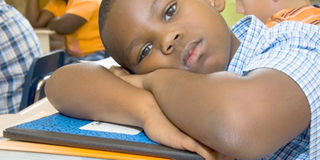Preps: When do students rest?

According to behavioural experts, children can barely do any productive reading prep time because they are tired. Below the learning pyramid demonstrates the way learning should happen in schools. NET PHOTO
What you need to know:
- Schools normally enforce preps for students to revise something that education experts say is not helpful because it encourages cramming. Besides, they say, students are normally tired and incapable of doing any productive reading after a long day.
Back in my school days, I barely did any substantial reading during preps because I was either too tired or felt too cold. Then there were times when the students were too bored that they just chatted away attracting punishment; usually kneeling on gravel for hours. Just like me, do students do any actual reading during preps or it is something that should be revised and enforced according to age?
Perhaps prep time is the most dreaded time for a school-going-child. It is worse when it the 5am one. The thought of waking up as early at 4am each day of the week to be ready by 5am, and the punishments that come with being late is something these students dread the most. Then there is the evening time that comes with the struggle to stay awake from 7pm to 9pm or 10 pm for some schools!
Francis Okweda, an academic supervisor and content specialist at Froebel Kindergarten and Primary School, says preps are beneficial because they give the child time to focus on what they learnt without a teacher. However, he says, they are not worth their salt because with the learner having been in class the whole day, to keep them in the night still focused on books is to ignore other crucial aspects of life.
“For instance, a normal family setting would be that in the evening, parents and children are chatting, eating together, and getting acquainted with current affairs.”
Rethink the strategy
Although Caleb Mwesigwa, a former teacher at Makerere High School, believes this private study time is beneficial, circumstances cannot allow the students to use it profitably. “Students will concentrate for a few minutes during prep time because in the evening, they are already very tired and those who are able to stretch can only cram,” he asserts.
Alluding to ‘The Learning Pyramid’, Okweda calls on schools to take advantage of it to get better results from students.
“According to the pyramid, five per cent is all a child retains at the end of a lesson. While reading, as is common during preps, an individual can only retain 10 per cent. The other components of the pyramid are the use of audio-visuals (20 per cent), demonstration (30 per cent) discussion groups (50 per cent), practice by doing (75 per cent) and immediate use of what was learnt such as teaching others helps one retain 90 per cent.”
These facts guide Okweda’s view that prep time should be a period for free brainstorming, guided interaction with exposure to more than one resource.
Losing interest
“The environment does not have to be quiet but neither out of control. If it was a moment of reflection, debating, arguing, discussion, contemplating on the major concepts they got in the day and in groups rather than isolation, it could yield more understanding than cram work,” he asserts.
Mwesigwa paints the picture of what happens during prep time as such, “Many children doze or chat hence getting punished. Punishment does not help because the child is indirectly telling the teacher that they are bored and need new challenges. Unfortunately, the teacher has nothing new to bring seeing that that is how he was also taught,” he says.
He also cautions that whereas punishing someone for a natural occurrence would be acceptable in a military setting, it is inappropriate in a school setting.
Beyond these problems, it is a pity that primary and secondary school children spend the same time during preps regardless of the difference in their age. To that, Mwesigwa says, “Secondary school students and primary children should have different length of time for preps. Their concentration span differs.”
Looking at the health side, Dr Boniface Ssegujja, a pediatrician at Children’s Clinic, Naalya, says the circadian rhythm (body clock) is a 24 hour cycle that tells the child’s body when to sleep and it is influenced by the age of the child. “The younger children require more sleep than their older counterparts.”
He cites the Canadian Pediatric Society which recommends 16 to 18 hours for newborns (0 to 2months). For school-aged children (5 to 10 years), 10 to 12 hours is ideal.
Consider the age
“Older children and teens between six and 13 years require nine to 11 hours while those between 14 and 18 years require eight to 10 hours.”
But with preps starting as early as 5am yet they slept as late as 11pm, Dr Ssegujja notes that this sleep time is not observed.
Yet, he says, sleep is a very important aspect of a child’s mental and physical health as those who consistently get a good night’s sleep are more creative, can concentrate on tasks for long periods, have better problem solving abilities, are able to make positive decisions, learn and remember new things.
This prolonged study leads to a range of behavioural, mental and emotional problems.
Parents, the ministry and all stakeholders need to rethink this, otherwise our children will never enjoy their childhood.




